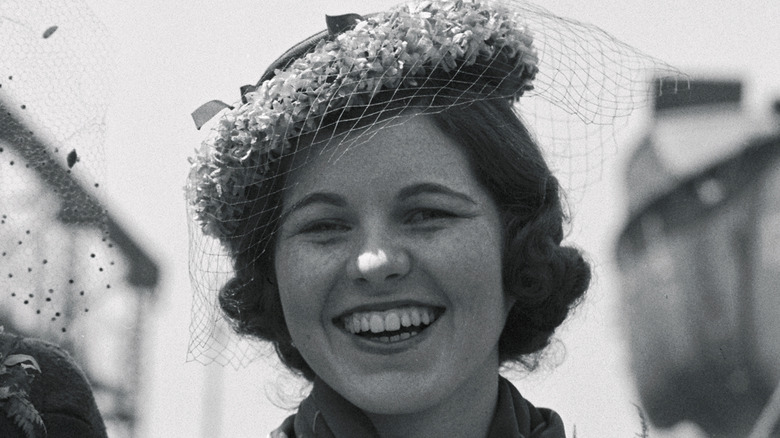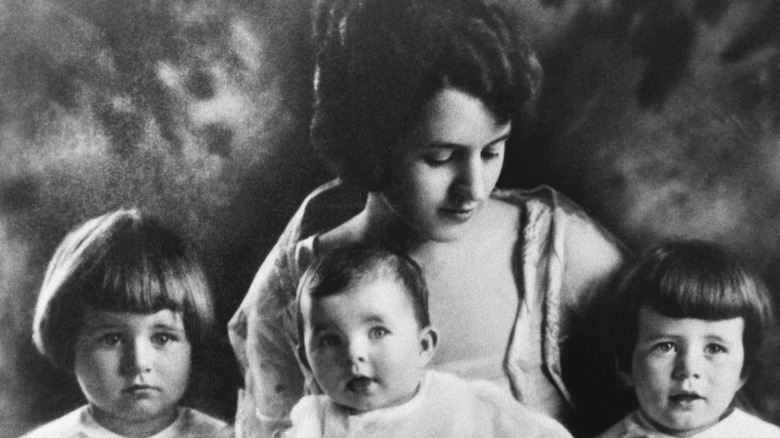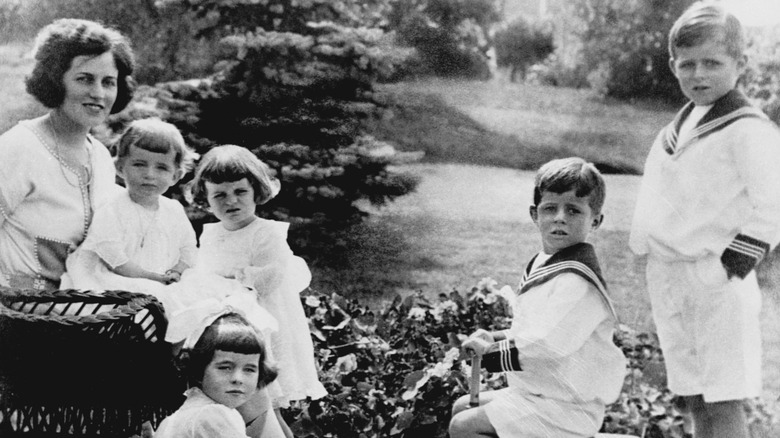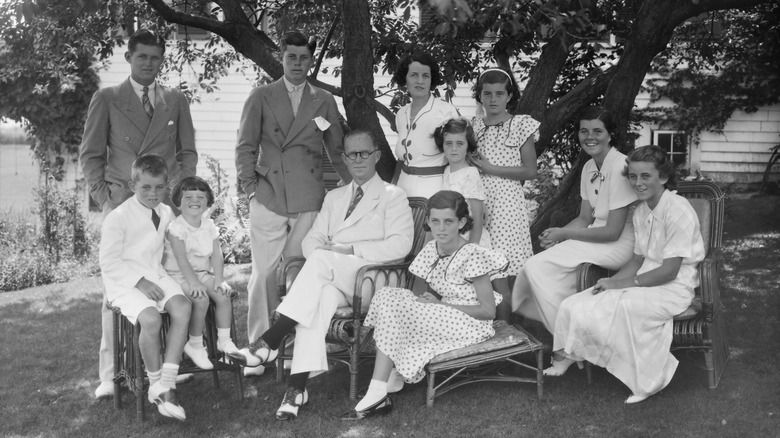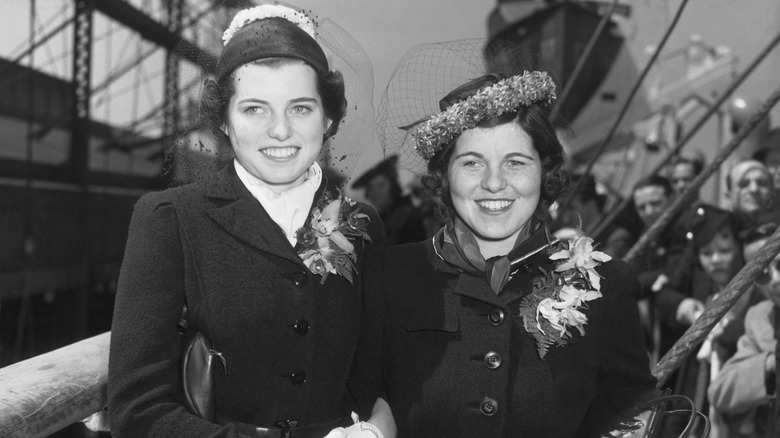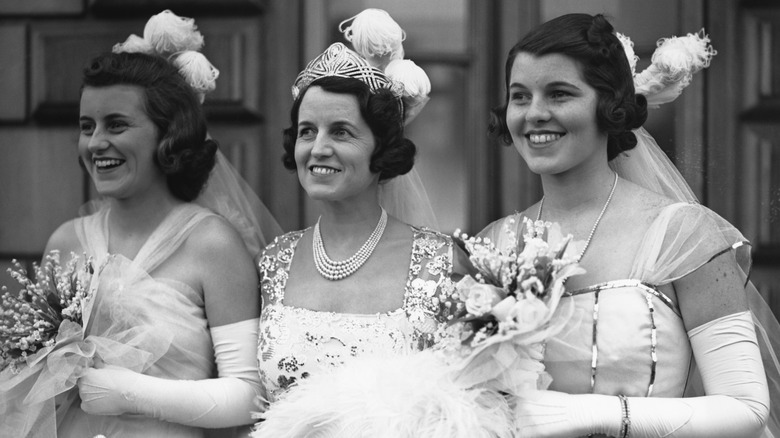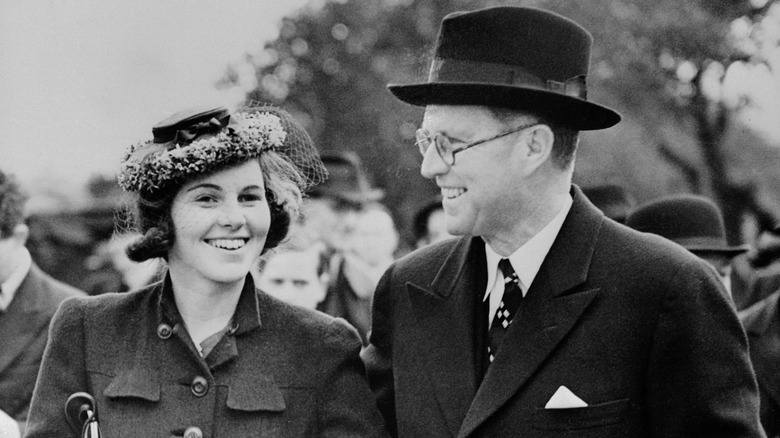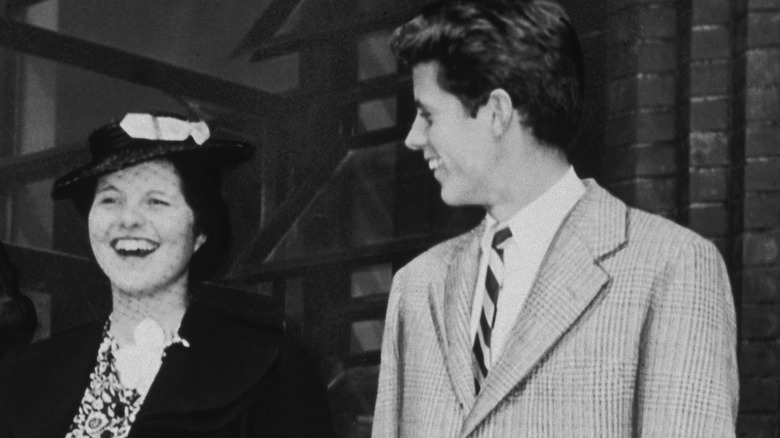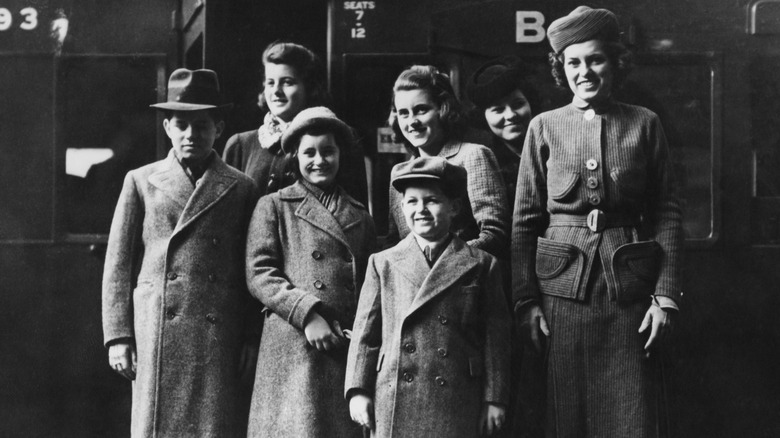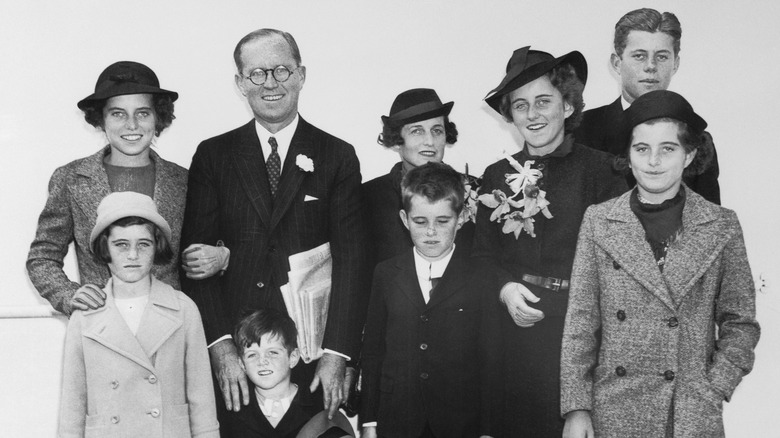The Tragic Story Of JFK's Sister Rosemary
No matter what your political views are, the Kennedy family is perhaps one of the best-known political families in the United States. While the family was in politics for several years, the Kennedys undoubtedly rose to fame when John F. Kennedy won the 1960 presidential election. One of nine siblings, JFK wasn't the only one in his family to enter politics. His brother, Robert F. Kennedy, served as JFK's attorney general while the late Ted Kennedy served as a U.S. Senator. Other siblings were also involved in public life, including Eunice Kennedy Shriver and Jean Kennedy Smith.
At the same time, the Kennedy family is also famous for their personal tragedies. While JFK and his brother Robert Kennedy were both assassinated, JFK's older brother, Joseph P. Kennedy Jr., was killed during his navy service in WWII. His younger sister Kathleen "Kick" Kennedy was also killed in a plane crash in 1948, and his own son, John F. Kennedy Jr., was killed in a plane crash with his wife, Carolyn Bessette Kennedy, and her sister in 1999.
But another tragic story is that of JFK's eldest sister Rosemary Kennedy. Due to her circumstances, she was not widely discussed in public life and was purposely kept secret to protect the political aspirations of her siblings. Here are the critical details of Rosemary's life that have most recently come to light.
Her birth was erroneously delayed
Rosemary Kennedy was the third child born to Rose and Joseph P. Kennedy on September 13, 1918. However, her birth may have robbed Rosemary of the necessary oxygen she needed. It's assumed that errors at birth caused her to have permanent behavioral struggles as well as developmental delays.
But why was Rosemary's birth delayed, to begin with? Kate Clifford Larson, an award-winning historian and the author of "Rosemary: The Hidden Kennedy Daughter" wrote that when Rose Kennedy went into labor, her nurse was uncomfortable with delivering the baby on her own, and opted to wait for a doctor to arrive. However, this didn't occur for two hours. In the meantime, the nurse made Rose squeeze her legs together, while the nurse physically held Rosemary's head into her mother's birth canal. This critical error was not only painful for the mother, but the aftermath would impact Rosemary for the rest of her life. As the Birth Injury Center explains, while most babies go on to recover from oxygen deprivation at birth (birth asphyxia), others may suffer brain damage that can cause developmental delays, learning disabilities, or cerebral palsy.
She displayed developmental delays as a toddler
Rosemary Kennedy reportedly began to show developmental delays as a toddler and didn't develop in terms of mental capabilities as quickly as her older brothers Joseph P. Jr. and John F. Kennedy. These included milestones such as crawling and walking, though her parents weren't initially concerned. It wasn't until Rose Kennedy noticed that Rosemary's younger sisters surpassed her developmentally that she realized her daughter might need more support.
In the early 20th century, intellectual and developmental disabilities were not widely acknowledged, and the necessary diagnostic tools and therapies were lacking. At the time, the stigma surrounding physical and intellectual disabilities was prevalent, which didn't help young Rosemary's circumstances. With few options for help, her parents opted not to send Rosemary to an institution, as was customary at the time, but instead raised her at home. She was also included in regular family activities.
Tantrums and violent outbursts began during adolescence
Rosemary Kennedy is thought to have had a happy childhood, and her mother said she was a "loving girl," according to the National Park Service. However, as young Rosemary entered adolescence, she reportedly experienced frequent tantrums and outbursts. These would also sometimes turn physical. While little was known about intellectual disabilities in Rosemary's era, such outbursts were likely due to frustration and communication barriers.
It also wasn't easy being a Kennedy. As such, Rosemary's tantrums could very well have been linked to the pressures she endured from being part of such a prominent and reputation-protecting family. Her father Joseph P. Kennedy was very much engaged in local politics during her childhood and was also the president of a local bank. He would become "one of the richest men in America" due to his business ventures, according to PBS, and he also went on to serve as the U.S. Ambassador to Great Britain and chairs of the Securities and Exchange Commission and Maritime Commission. His isolationist views would hold him back in political endeavors, so he would attempt to pressure his sons into political office.
As historian and author Kate Clifford Larson writes on her website, Rosemary's "lack of advancement as she grew older, and her preference for social activities, frustrated her parents." This inevitably caused conflict between the high-achieving Kennedy family and Rosemary, who was often misunderstood. As Clifford Larson writes, she experienced "rising anxiety over standards she could never meet."
Rosemary experienced loneliness when she moved between schools as a teenager
Rosemary Kennedy attended public schools in her early years, but her parents realized that it was difficult finding the right school to fit their daughter's needs. This resulted in Rosemary shifting between several schools, further enhancing the teenager's frustration and difficulties. According to the National Park Service, Rosemary had to repeat grades due to a lack of academic development. As historian Kate Clifford Larson's research reveals, it was estimated that she read between a third to fourth-grade level.
As a teenager, Rosemary went between boarding schools as her parents became increasingly concerned about her lack of academic advancement. While her struggles with balancing friends, family, and schooling, were admittedly ordinary for a teenager, the constant changes in her learning and living environment took their toll as Rosemary struggled to meet her parents' standards. Moreover, Clifford Larson writes that she experienced extreme loneliness while attending boarding school. "Their constant demands for improvement from a child with intellectual disabilities felt insensitive and sometimes even cruel to me," Clifford Larson asserts on her website.
Rosemary was temporarily enrolled at a Montessori school in England while her father was the Ambassador to Great Britain. It seems she was happy and thrived here, but the experience was short-lived as the Kennedy family moved back to the United States when World War II started.
As Rosemary got older, the Kennedys attempted to shield her from men
Rosemary Kennedy's parents had trouble coming to terms with their daughter's increasing beauty and the attention men paid her. Apparently, her father became concerned that "her voluptuous figure was attracting male attention" and that "an unwanted pregnancy" could destroy the future political futures he envisioned for his sons, according to historian Kate Clifford Larson in the book "Rosemary: The Hidden Kennedy Daughter" (via People).
What's more, as Rosemary became a young adult, she grew frustrated over her lack of freedom which was in stark contrast with her siblings. According to the National Park Service, she even started sneaking out at night at one of the boarding schools she lived in. This behavior added to her parents' concerns that she would start to attract the wrong type of attention or publicity.
Rosemary preferred her social life, as was typical for people her age. However, in an attempt to shield her from men, Clifford Larson reports that at dances, she was either partnered with her brother or with friends of the family. This was all overseen by her father, who wanted to "keep her limitations a secret and avert potential embarrassment," Clifford Larson writes on her website.
Her father ordered a terrifying and dangerous lobotomy
The ever-fearing and controlling patriarch of the Kennedy family made the decision to have Rosemary Kennedy undergo a lobotomy in 1941 when she was 23 years old. This experimental brain surgery was designed to help "fix" people with intellectual disabilities and mental health conditions such as depression and schizophrenia. The controversial procedure involved severing lobes or lobe pathways in the brain. This was accomplished by making small holes in the head. Due to the emergence of medications, lobotomies are rarely performed in modern days. Records indicate that Rosemary was awake during the process, reciting poetry and verbally communicating with the medical team (via Verywell Mind).
Lobotomies were highly controversial procedures that sparked intense debates within the medical community and society as a whole. While initially seen as a promising treatment for various mental health conditions, the long-term effects and ethical implications of lobotomies raised serious concerns.
While lobotomies were said to be helpful on an anecdotal level, there was also the risk that the surgery could go wrong. This was tragically the case for young Rosemary Kennedy. Despite doctors assuring her father that the procedure was safe, Rosemary's life was changed forever after the botched surgery. The procedure had a profound impact on her, leading to a significant disability that left her unable to perform daily tasks on her own. This forced her to reside in an institutional setting for the rest of her life.
Rosemary lived the rest of her life in psychiatric facilities
After failing to "cure" Rosemary Kennedy, her father sent his daughter to a New York psychiatric facility immediately after the botched lobotomy. She resided there for seven years, rarely receiving any visitors. She was then transferred to Saint Coletta, a disability service and support organization in Wisconsin. According to historian and author Kate Clifford Larson in the book "Rosemary: The Hidden Kennedy Daughter" via People, Rosemary never saw her father again. However, her mother would still make visits.
Even more tragically, she was still hidden from her siblings, who wouldn't see her until the 1960s — about two decades after the failed lobotomy. According to Clifford Larson via People, Rosemary's siblings were lied to about her condition and whereabouts, with her younger sister Jean Kennedy even being told that Rosemary had moved to the Midwest to become a teacher. After her father, Joseph P. Kennedy suffered a stroke in 1961, the siblings finally learned the truth about their sister. Clifford Larson writes that John F. Kennedy visited his sister Rosemary for the first time during his presidential campaign.
Rosemary received therapies and the attention she needed during her time at Saint Coletta. As her siblings later learned what had become of their sister, they began actively visiting her. Rosemary became especially close with her younger sister, Eunice Kennedy Shriver.
Rosemary died in 2005
Rosemary Kennedy lived at Saint Coletta for the rest of her life until January 2005, when she died at the age of 86 due to natural causes. Rosemary's surviving siblings Eunice, Jean, Patricia, and Ted Kennedy were at her side when she died. She was buried at the Holyhood Cemetery in Massachusetts where she is at rest with her parents.
Rosemary's younger sister with whom she shared a close bond, Eunice Kennedy Shriver, died shortly after Rosemary in August 2005. Like their father Joseph P. Kennedy, Eunice suffered a stroke. Patricia Kennedy died from pneumonia in 2006, and Senator Ted Kennedy died in 2009 from brain cancer. Jean Kennedy Smith was the last surviving sibling of the Kennedy family. She died in 2020 at the age of 92.
Despite Rosemary and her siblings' passings, all are credited for helping to bring awareness to intellectual and physical disabilities, arguably making long-lasting impacts on disability rights.
Until recently, Rosemary was known as the forgotten Kennedy
Rosemary Kennedy's parents undoubtedly created a powerhouse family, with all of her siblings either involved in politics or other forms of public service. As increased awareness of disabilities and the ever-growing fascination with the Kennedy family continues, Rosemary's important story has more recently come to light.
As once the "forgotten" Kennedy, the public now knows more about her thanks to the publication of Kate Clifford Larson's 2015 biography "Rosemary: The Hidden Kennedy Daughter," as well as other books and articles online.
Of course, it's important to keep in mind that the reason Rosemary was largely kept a secret was due to her parents' fear of the stigma surrounding people with disabilities. Such a tragedy should not be forgotten. Fortunately, once Rosemary's siblings learned the truth about their sister, they made it a point to make sure her life would be recognized in a big way, and that her legacy could help others for years to come.
Rosemary inspired her siblings to get involved in advocacy for disabilities
After her death in 2005, Rosemary Kennedy's legacy still lives on thanks in part to the programs her siblings created. Since learning of their sister's residence at Saint Coletta's after being kept a secret for so many years, it was Rosemary that ultimately inspired her siblings to get involved in disability advocacy. As Kate Clifford Larson writes on her website, finally seeing Rosemary at Saint Coletta's was "a reckoning" for her siblings "that inspired them to direct attention to the plight of the disabled, transforming the lives of millions."
President John F. Kennedy became the first president to create and sign legislation that would help individuals with learning disabilities. In 1968, Rosemary's beloved sister Eunice Kennedy founded the Special Olympics, which now operates worldwide. Her other younger sister Jean Kennedy also founded an art program for people with disabilities called Very Special Arts (VSA). The Kennedy matriarch, Rose Kennedy, also reportedly made speeches to raise awareness about children with disabilities.
